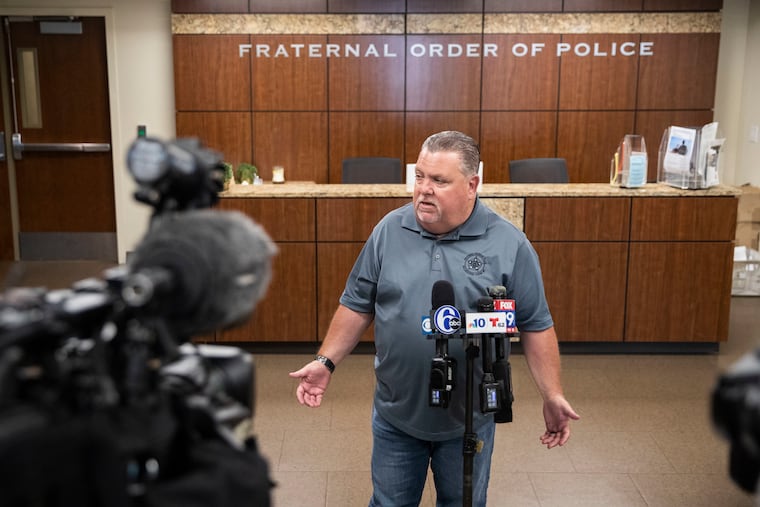A win for the police union should not be a loss for Philadelphia | Editorial
The Fraternal Order of Police is once again putting the indiscriminate job security of its members ahead of public safety.

The Philadelphia Fraternal Order of Police continues to be an obstacle to deeply needed reforms. In keeping with their misguided priorities, union leadership is once again putting the indiscriminate job security of their members ahead of public safety, even as gun violence soars and crime is on the rise.
The latest outrage? After years of delay, the FOP extracted an extremely high cost in exchange for allowing the city’s efforts to replace some sworn police officers with civilians and create a unit of unarmed traffic enforcement officers.
The proposed changes have been brewing since 2019, when in the interest of public safety, Philadelphia City Council and the city’s voters overwhelmingly approved a plan to offload certain responsibilities from the Police Department.
Mayor Jim Kenney, Police Commissioner Danielle Outlaw, and every mayoral candidate who has talked to the Editorial Board have supported this measure. As Outlaw has said, “civilianization puts more boots on the ground, which is exactly what this department needs in order to better serve our communities.” A University of Pennsylvania study found that almost 900 positions currently held by sworn police officers could be filled by civilians, freeing those officers to more directly fight crime.
» READ MORE: Philadelphia’s mayoral candidates outline their plans to improve public safety in the city | Opinion
This sounds like common sense. At least to everyone but FOP president John McNesby, who sought to block the plan citing his union’s protections under Pennsylvania’s Act 111, which regulates collective bargaining for emergency services that aren’t allowed to strike for safety reasons.
To be sure, unions are meant to protect their members, and labor leaders do their job when they shield workers from unreasonable demands. But much like Act 111 recognizes that emergency service providers merit distinctive consideration, the job of being a first responder demands reciprocity in considering the public good.
With at least 500 homicides and 4,000 shooting incidents a year becoming the city’s new normal, urgency was paramount to help keep Philadelphians safe. It is damning that FOP leadership was in no rush.
The agreement between the city and the union, reached through arbitration earlier this month, will barely speed up the process of getting more officers into critical roles. While the long-awaited traffic enforcement officers will hopefully begin deployment shortly, the city only secured the ability to hire civilians in relatively few other roles, such as running mail and performing graphic design.
Those positions also won’t be turned over to civilians anytime soon. Along with significant retention and hiring bonuses for its membership — as well as a one-time $1.5 million contribution toward its legal expenses — the FOP sought, and secured, a concession that no one will be reassigned.
» READ MORE: Philadelphians have been waiting nearly 3 years for unarmed traffic enforcement. That’s too long. | Editorial
That means that rather than contributing to bringing down call response times immediately, it will take years for many of these roles to switch over.
Given this haul, and how little was given up to secure it, other unions may seek to borrow the FOP’s negotiators, or hope that their employer hires the Kenney administration’s team. This would be a misdiagnosis of the problem. No matter who is sitting on either side of the table, police contract arbitration is governed by Act 111, which stacks the deck in the police union’s favor.
Lawmakers have talked for years about the need to rein in the law, which was designed to compensate police and firefighters for their inability to strike. While the intent was to ensure that these workers didn’t lose out by sacrificing one of organized labor’s most effective tactics, the law has sometimes enabled police unions to make policy decisions themselves, at the expense of public safety and the clear will of the voters.
After all, it isn’t just civilianization that police unions have successfully undermined.
Act 111 has made firing police officers, even for extreme misconduct, a burdensome and quixotic process. Fired cops are routinely rehired, with the most recent egregious case a supervisor who sent bestiality videos to subordinates. Shamefully, the FOP defended this officer even though those he harassed were also its members, deserving of the full support of their union.
Until FOP leadership changes course, prioritizing safety and security for all, those concerned about stemming Philadelphia’s endemic violence should look elsewhere for allies.